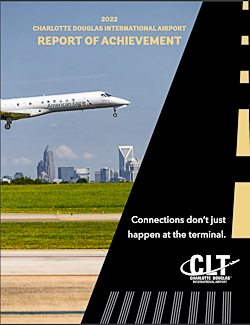Now is an Ideal Time to Support Inclusion
More than 30 years ago, Congress recognized the importance of equity and inclusion in airport contracting by enacting legislation to facilitate participation by Disadvantaged Business Enterprises (DBEs). In 1987, it added a separate, similar program focused on Airport Concession Disadvantaged Business Enterprises (ACDBEs). As a result, thousands of small, minority- and women-owned businesses have been able to compete on a level playing field with larger, more established contractors.
A lot has changed in 30 years, but the fundamental value of diversity in airport contracting has not. The DBE programs help redress past and ongoing discrimination on the basis of gender, race or ethnic background. Moreover, participating employers create thousands of jobs and millions of dollars in economic value for marginalized communities.
The way our country funds airport improvement has, however, changed drastically over the years. When the DBE program was first enacted, Airport Improvement Program (AIP) funds were the main source of federal support for airport development. Then, in 1990, Congress authorized certain airports to collect passenger facility charges (PFCs) to supplement their AIP funding. As time passed, PFCs often remained fixed, causing heated debate for years.
 Krystal J. Brumfield Krystal J. Brumfield Krystal J. Brumfield is president and CEO of the Airport Minority Advisory Council, a non-profit organization dedicated to promoting the inclusion of minorities and women in the multi-billion dollar aviation industry. Specifically, it advocates for the participation of minority-owned, women-owned and disadvantaged business enterprises in airport contracting. |
The current $4.50 PFC cap has become a hot-button issue in part because PFC revenues have displaced AIP funds as the primary source of funding for airport capital projects. This trend carries significant consequences for DBEs, because the PFC statute does not include participation goals for minority- and women-owned businesses or other disadvantaged groups. As a result, DBE participation for AIP-funded contracts is approximately 21.2%, but only 12.4% for contracts funded by PFCs. This discrepancy amounts to millions of lost job-hours and revenue for DBEs, and does not fulfill Congress' intent to promote equity and inclusion.
These effects have been compounded by the fact that airport DBEs and ACDBEs are held to more restrictive size standards than other federal small business programs. Other programs generally use revenue classifications established by the U.S. Small Business Administration (SBA). However, airport and other transportation programs use a standard that is sometimes 35% lower. Not only does this different standard amount to manifestly unfair treatment of minority- and women-owned businesses in the airport sector, it also prevents them from realizing economies of scale by subcontracting with other firms.
As the incoming president and CEO of the Airport Minority Advisory Council (AMAC), I am committed to ensuring that equity and inclusion remain at the forefront of the policy agenda for the airport/aviation industry. We must meet the challenges posed by changes in business models and funding streams with adaptability and innovative thinking to ensure that these values remain as strong 30 years from now as they are today.
I am pleased that AMAC has led a spirited advocacy campaign to modernize the PFC statute and the small business size standards for transportation programs. Specifically, we have urged the inclusion of participation goals for minority- and women-owned businesses in the PFC program, to provide parity with the requirements under AIP-particularly in connection with any increase in the PFC cap. In addition, we have encouraged Congress to conform the size standard for airport DBEs and ACDBEs to the definition SBA uses. These initiatives would go a long way toward preserving congressional intent regarding diversity in airport contracting, and open up important new opportunities.
While these initiatives have been part of AMAC's policy agenda for several years, a new session of Congress and new administration present unique opportunities to advance them over the finish line. In particular, President-elect Donald Trump has frequently lamented the state of our country's "third world" airports, and has pledged to commit substantial resources to infrastructure development and renewal. Amendments to the PFC program and size standard could fit into a broader infrastructure proposal, helping ensure that airports continue to benefit from the experience and expertise of minority- and women-owned businesses. The FAA reauthorization due in September 2017 could offer another opportunity to make these much-needed policy changes.
AMAC is proud of its long history working with the industry to advance diversity in airport contracting. Together, we have evolved and adapted to meet the changing needs of the aviation business. The evolution of the DBE and ACDBE programs is a natural part of this progression, and an important step to ensure equity and inclusion in our industry. We look forward to continuing working with all of you to uphold these core values now and in the future.
2022 Charlotte Douglas International Airport Report of Achievement
 Giving back to the community is central to what Charlotte Douglas International Airport and its operator, the City of Charlotte Aviation Department, is about, and last year was no different.
Giving back to the community is central to what Charlotte Douglas International Airport and its operator, the City of Charlotte Aviation Department, is about, and last year was no different.
Throughout 2022, while recovering from the COVID-19 pandemic, we continued our efforts to have a positive impact on the Charlotte community. Of particular note, we spent the year sharing stories of how Connections Don't Just Happen at the Terminal - from creating homeownership and employment opportunities to supporting economic growth through small-business development and offering outreach programs to help residents understand the Airport better.
This whitepaper highlights the construction projects, initiatives, programs and events that validate Charlotte Douglas as a premier airport.
Download the whitepaper: 2022 Charlotte Douglas International Airport Report of Achievement.








